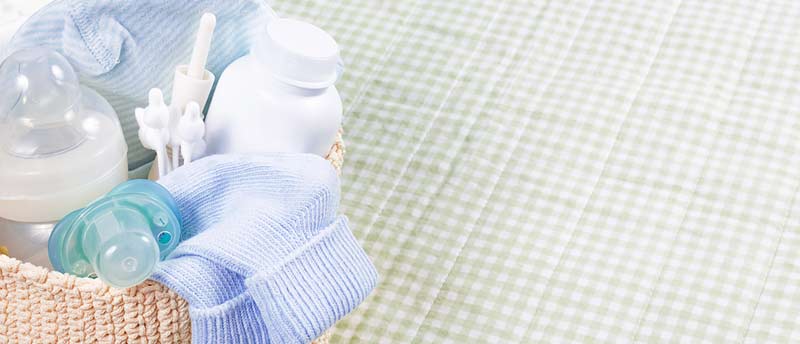7 Harmful Ingredients in Baby Care Products

Parents may be shocked to learn how many baby products contain harmful ingredients. The additives in products like teething rings have been linked to serious health problems. But, which ingredients should concern you?
Talc
Who doesn't love the sweet smell of baby powder? Baby powder is made from a mineral called talc, which is composed of magnesium, silicon, and oxygen. Talc became associated with cancer risk years ago, when it was often contaminated with asbestos.
People are filing lawsuits over talc-linked cancer. Learn more here.For years, manufacturers claimed their baby powder products were free of asbestos. But as recently as 2019, tests showed asbestos contamination in Johnson's Baby Powder.
In May 2020, Johnson & Johnson stopped selling talc-based baby powder in North America. The company claims this change was due to declining sales related to the COVID-19 pandemic.
Parents can avoid the risks of asbestos-contaminated talc by choosing cornstarch-based baby powder instead.
Bisphenol-A (BPA)
You've probably heard of the hormone-disrupting chemical BPA. It causes damage to the brain, reproductive system, heart, liver, and more. Well, BPA has actually been found in certain baby products.
A team of scientists investigated the substances found in teething rings. Researchers placed 59 of the most popular rings in individual containers of water. When the water was tested, they found several harmful chemicals (including BPA) had leached out at detectable levels. What's most disturbing is that many of the products had been labeled "BPA-free."
Formaldehyde
In 2011, formaldehyde was classified as a "known human carcinogen" in a report by the National Toxicology Program. Researchers linked long-term formaldehyde exposure to an increase in leukemia and brain cancer. This exposure happened over many years. Thus, manufacturers consider limited exposure to small amounts of formaldehyde safe.
Low level exposure could still be harmful, though. The words "known human carcinogen" are very clear. Some manufacturers have begun eliminating formaldehyde from their baby products. They cite consumer concerns as the motivation for this change. However, some products do still contain formaldehyde "releasers."
Propylene Glycol
This petroleum-based chemical absorbs liquids. It also maintains a uniform moisture level in antifreeze and many other consumer goods. Some brands of baby wipes contain propylene glycol.
It is well known and accepted that propylene glycol is dangerous in high doses. But, it is not clear whether small doses on the skin cause harm. However, you should be careful to always put baby wipes away immediately after use. This can help keep your child from putting one in their mouth. At higher concentrations, propylene glycol can cause skin irritation and contact dermatitis.
Fragrance
Many products include an ingredient called "fragrance." Manufacturers often choose not to disclose exactly what is included in such an ingredient. According to the Fair Packaging and Labeling Act, all ingredients must be listed. But some can be protected as "trade secrets." This loophole allows manufacturers to keep certain fragrance additives private.
Many different artificial and natural substances are used to create these scents. So it can be difficult to fully know what may or may not be coming into contact with your child. In order to avoid dangerous fragrance additives, parents can buy products without this ingredient.
Flame Retardant Chemicals
Flame-retardant pajamas sound like a great idea. Unfortunately, chemicals are used to make fire-retardant fabric. These chemicals have been linked to cancer and other serious medical problems.
Is it worth the risk to buy your baby or child pajamas with flame-retardant chemicals? Every parent will have to weigh the pros and cons. Parents can take the following steps without risking exposure to dangerous fire-retardant chemicals:
- Avoid loose-fitting clothing, as it is more likely to make contact with flames and ignite.
- Install several smoke detectors in your home, and replace batteries regularly.
Mineral Oil
Baby oil is one of the most popular infant care products. Used exactly as directed, mineral oil is considered safe. However, children have developed serious respiratory problems by inhaling small amounts of mineral oil. Mineral oil can impair the cough reflex. This can allow the fluid to travel all the way into the lungs and cause serious illness.
Parents can avoid the dangers of mineral oil inhalation by ensuring children cannot reach or open the mineral oil container.
Reducing the Chemical Load
Parents can shop for safer, more natural baby products. Perhaps the easiest way to reduce the chemical load on their child's developing bodies is simply to read labels.
